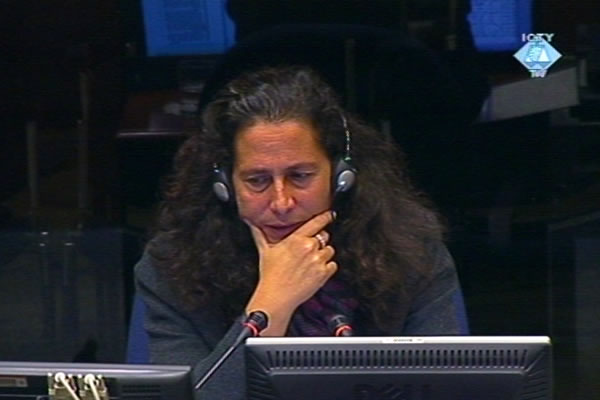Home
‘CERMAK DID NOTHING ABOUT CRIME REPORTS’
Maria Teresa Mauro, former civil affairs official in the UN mission in Krajina claims that in the aftermath of Operation Storm the Croatian authorities did not respond to reports they received from international observers about crimes against Serbs. As time went by, the property of the people who fled was completely destroyed and looted and Serbs ‘didn’t even think’ about coming back. As the witness alleges, General Ivan Cermak was ‘the highest representative’ of the authorities in the Krajina area
 Maria Teresa Mauro, witness in the Gotovina, Cermak and Markac trial
Maria Teresa Mauro, witness in the Gotovina, Cermak and Markac trial In the summer of 1995, Maria Teresa Mauro was a UN civil affairs official in Sector South. In the aftermath of Operation Storm she patrolled Krajina as a member of the Human Rights Action Team, reporting the violations of human rights and attacks against Serb civilians and their property. In her statement to the OTP investigators in 2000 and 2008, and at the trial of generals Gotovina, Cermak and Markac today, the witness said that she and her colleagues reported crimes to Croatian police and the office of one of the accused, General Ivan Cermak.
As the witness claims, after Operation Storm Cermak was ‘the highest authority’ in Krajina. He was always in uniform and everybody in the UN, including the interpreters, called him the ‘military governor’. Everybody in the mission, including UN Sector South commander General Alain Forand, clearly knew that Cermak was the person to talk to if there were any major problems; Cermak was also the person whose name they used in the field.
In August and September 1995 her team, the witness contends, reported several crimes against Serb civilians to Cermak’s office. The crimes included murders, looting and arson. At informal meetings with Cermak in the UN base in Knin, Cermak assured the witness he would deal with the crimes saying that the situation was under control. However, nothing would actually happen. UN personnel never received any information about investigations of the crimes they reported and the punishment of perpetrators.
The witness left Knin in December 1995. In June 1996 she took part in a research project about the status of Krajina refugees in Serbia, run by the UN office in Belgrade. In her words, none of them considered returning to Croatia; their houses were either destroyed or looted. The livestock that was their sustenance was gone and the abuse of the Serbs that remained in Krajina continued. Refugees were particularly discouraged by the fact that ‘the Croatian authorities were reluctant’ to issue them permits to visit their houses.
As before when former UN personnel claimed Cermak had authority in Krajina, defense counsel Higgins tried to prove that the witness did not know the formal function and jurisdiction of the accused general. Cermak, the defense claims, was the commander of the Knin Garrison in charge of liaising with international organizations, functioning of the economy and municipal services in the liberated area. Mauro agreed that she never knew what Cermak’s official authority was, but, as she repeated, everybody saw him as the ‘highest authority’ and called him ‘military governor’.
Linked Reports
- Case : Gotovina et al. - "Operation Storm"
- 2008-11-17 ARE BARRACKS A LEGITIMATE MILITARY TARGET?
- 2008-11-14 GOTOVINA DEFENSE INVOKES MARTIC AND STRBAC
- 2008-11-13 FINAL DESTINATION FOR THE EVACUEES
- 2008-11-21 PROSECUTION MILITARY EXPERT: ‘GOTOVINA KNEW ABOUT CRIMES’
- 2008-11-24 PROSECUTION: GOTOVINA ‘INCITED’ CRIMES BY DOING NOTHING
- 2008-11-25 ‘OPERATIONAL’ AND ‘PROFESSIONAL’ CHAIN OF COMMAND
